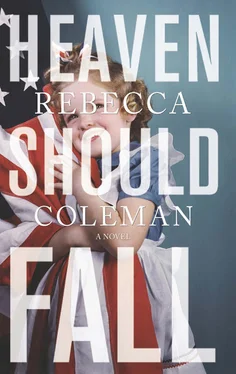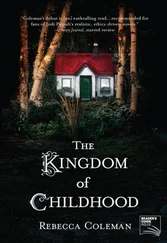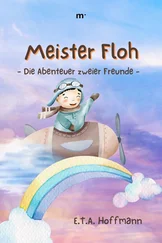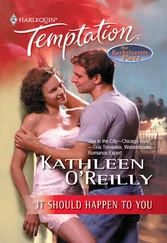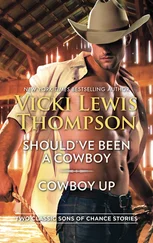She thought about it often. On the stereo in their station wagon there was a knob for the volume and a sliding control that deepened the bass. If she slid it lower, even the lightest song on the inspirational-rock station developed a palpable throb. Made it vibrate in her bones. Her predilection was the same way. No matter how sweet the song inside her, if they drove past a traffic stop and saw a man being taken into custody, or if in the church coatroom a man struggled to get out of the sleeves of his coat, the bass lever in her throttled downward. By thirteen she knew it was shameful. Anything that made your thoughts go that way was a shame on you, by its very nature. Get thee back, Satan . It was almost certainly what the apostle Paul had meant when he wrote about the thorn in his side. The church, her pastor said, was a hospital for sinners, not a museum for saints. And so there she was, more and more often, and that was not shameful.
Then she was fourteen, and there came the day of the Easter passion play. She wore a smock made of sackcloth and a thin crown of flowers. She was part of the Hallelujah chorus. The man playing Jesus, naked but for a rag wrapped around his hips, hauled his cross through the street that led to the church’s front yard. The Romans hoisted him onto the cross and, because the Jesus of their play was a real man and not a martyr, bound him to it with lengths of rope. His head lolled back, the tendons in his neck thrust and trembled against the thin skin, his hands contorted. She felt dizzy with the thrill and the horror. She was certainly damned.
When Dodge started coming around, drinking beer with her dad in the living room and inviting her to talk to him about school, she welcomed his attention with an almost frantic enthusiasm. When he asked if she would ride with him over to the sport shop to pick up a new vest for hunting season, her father gave his permission. They fucked in the front seat of his truck, and she was grateful. She was damned now for a specific, common thing. She would be in hell for a crime she could name. To see Dodge helpless with desire for her was empowering. And to take pleasure from him—for he offered it effusively—was surely nowhere near as evil as taking it alone, with thoughts as aberrant as hers.
She was a good woman now, and she lived a good life. She knew she was forgiven of her sins, although she could never quite believe that a payment would not be extracted from her sometime in the future. A reckoning, not for her sins, which were forgiven, but for her nature, which she carried inside her through her Christian life like a swallowed balloon full of heroin.
She told herself she needed to put her faith in God and know her fears were unfounded.
And then Elias shot himself in the head.
Jill
In the days between Elias’s death and his funeral, Leela cooked. She abandoned her workroom and spent what seemed like all day in the kitchen, making casseroles and long pans full of green beans seasoned with bacon, scooping precise balls of cookie dough onto baking sheets. Whatever wouldn’t fit into her own refrigerator she stored in Candy’s, and when space ran out in that, she cleared out the big chest freezer and laid down trays in that. On the dining-room table, in a long row down the middle, sat seven or eight family-sized chunks of defrosting meat. Each sat in an enamel pan, slowly dripping icy water around the edges of its plastic wrap. These were the former occupants of the chest freezer, and I supposed she intended to cook them, too.
It was all for the funeral. She seemed to be expecting the whole world to join her in mourning. She sent Cade to a catering supply store in Liberty Gorge to buy disposable aluminum cookware for buffets. The kitchen island was cluttered with giant cans from the cellar storage, FREEZE-DRIED CHICKEN and CORN BREAD MIX and MILK. Once, as she added a second layer of cardboard-textured dried potato discs to an au gratin casserole, Candy snapped at her, “Stop using up all our food storage. We might need that, you know.” Leela said nothing, kept at what she was doing, but I knew what she was thinking: the end of the world had already arrived.
Once the funeral was over, the food all eaten, she retired to her workroom and didn’t really come out. I knew she was still making her stars, because Dodge would come downstairs with an armful of boxes marked up for priority mail. When Cade came back from his camping trip with Dodge and she didn’t even come down to greet him, I went up myself to check in on her.
“They’re back,” I said. “Dodge and Cade. Them and about twenty pounds of stinky laundry and you’ll never guess what else.”
She shook her head. She was painting a stripe across a star. Her eyes weren’t puffy or red, and the room was tidy as ever. My heart ached for her, and I thought, not for the first time, that it would be so much easier to offer her comfort if she would make a show of her grief—to grow hysterical, scream and rant, allow her environment and personal habits to fall apart in a sort of tableau of what was going on in her head. But her dignity made me shy, and the gulf between us seemed to grow wider with each day that passed.
“Cade got a tattoo,” I told her. “He got it last week, but I don’t think he’s shown it to you yet. It’s a tribute, I suppose you’d call it. I don’t know. He seems more upbeat. I guess being out in the woods did him good. It always does, for people.” I leaned against the door frame and watched her paint for a minute. “You want to go for a walk or something? The river’s real pretty right now.”
Her voice sounded weary. “I don’t think so, Jill.”
“Just a quick one? How about a trade? Come out with me for a little while, and when we get back I’ll help you paint. Or package them up, or whatever you want.”
She looked up briefly. “I could use the help, that’s for sure. I’m trying to get seventy extra all ready for a craft show.”
This caught me entirely by surprise. “A craft show?”
“Yes. In Concord.” She swirled the brush in the water and uncapped a new bottle of paint. “For one thing, we could use the money. That death benefit by itself isn’t going to pay the costs of the funeral. And for another, it’s good to have something to do.”
“To stay busy, you mean?”
“Yes. A project. And this is mine. Can you hand me that brush right there? The very, very thin one.” I found it on the shelf above her table and handed it to her, and she added, “I’ll try to get Candy working, too. She can paint, a little. And she can drive, so that’s a help in itself, since I don’t.”
“I don’t mind watching her boys so she can do that.”
“Good. My girl’s got a brittle mind, like ice on a pond. Needs to always press forward in case the ground won’t hold her.”
“Cade’s just angry.”
She unfolded the magnifying lens that hung on a chain around her neck and peered through it at the field of stars, eyebrows up, focusing. In a voice like a stone skipping across the water, she said, “Men always get angry. It’s what they do.”
* * *
To help Leela, I took over the aspect of her barn-stars business that she just couldn’t handle these days: painting soldiers’ names on the inside backs or on wooden banners that hung from the bottom, at the request of the families who ordered them. They might have been active duty, or veterans, or killed in action; we had no way to tell. And what Leela needed right now was mechanical work, something she could churn out without thinking very hard, not a task that would force her to reflect and wonder. Every day, outside her craft-room door, I collected a box of stars and a square of notebook paper detailing the day’s orders. I took them down to the porch and worked alone, because I knew she needed the silent time far away from everyone else.
Читать дальше
